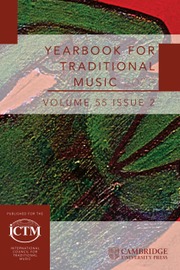Article contents
“From Identity to Alliance”: Challenging Métis “Inauthenticity” through Alliance Studies
Published online by Cambridge University Press: 18 January 2019
Extract
In the 1980s, ethnomusicologists began developing a body of literature exploring the intersection between music and identity. By the early 2000s, identity had become one of the most commonly addressed themes in the discipline and ethnomusicologists were making important contributions to identity studies. As Timothy Rice writes in his article titled “Reflections on Music and Identity in Ethnomusicology,” ethnomusicologists have demonstrated that music “gives symbolic shape” to pre-existing and emerging identities; and that music allows communities who share an identity to “see themselves in action” and “to imagine others” with whom they share the music tradition (Rice 2007:34-35). Ethnomusicologists have furthermore argued that music may contribute an affective quality to identity and give identities a “positive valence” (ibid.:35).
- Type
- Articles
- Information
- Copyright
- Copyright © 2018 by the International Council for Traditional Music
References
References Cited
- 1
- Cited by


